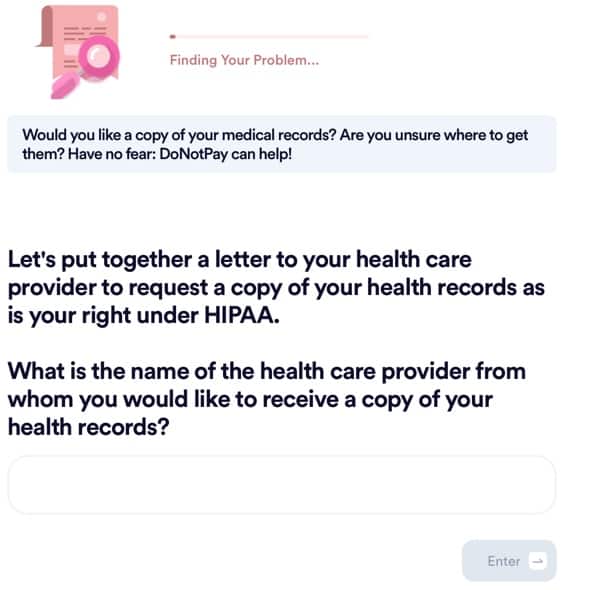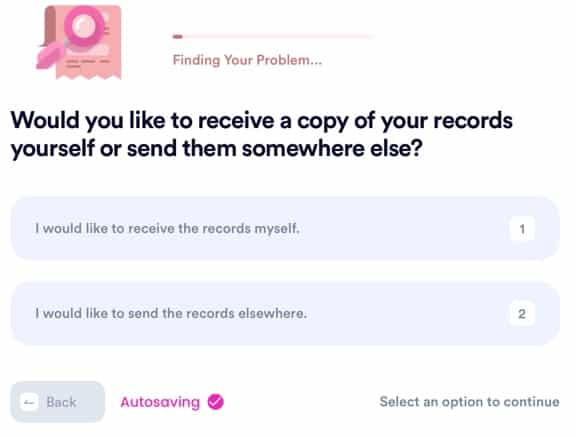How to Get My Medical Records?
If you find yourself asking "?" you are not alone. Many people need to request access to their medical records for a variety of reasons. Medical records are important for understanding your diagnosis, getting second opinions, transferring to a new doctor, filing insurance claims, assisting family members who may be seeking treatment for hereditary diseases, or a myriad of other reasons.
The good news is, you are legally entitled to access to your personal medical records under the Health Insurance Portability and Accountability Act. However, it is not always easy to figure out how to request those records. Fortunately, DoNotPay can help you learn how to get your medical records from any hospital or medical facility.
HIPAA: Your Right to Access Your Health Information
The Health Insurance Portability and Accountability Act (HIPAA) was enacted in 1996. HIPAA provides universal protection for your health information, as well as outlines how you, or your designated representative, can and health information.
| What Types of Records Can You Access? | The types of records you have a right to access include:
|
| Who Can Access Your Medical Records? | Under HIPAA, only a few people can access an individual's medical records and they are:
|
How Long Are Medical Records Kept?
If you want to know how long medical records are kept, the answer is that it varies by state. Although the average is about six years for adults, you should check your state laws for verification. For minors, records are usually required to be kept an average of ten years beyond the time they turn 18 or 21. You can always contact the state Department of Health for more information, particularly if you are having trouble .
How to Request Your Medical Records on Your Own
Whether you are trying to request medical records to have them transferred to another healthcare provider, to review your diagnosis or treatment plan, or for any other reason, you will need to submit a formal request. Here is an overview of what that might look like, but keep in mind the process may vary depending on the facility.
- You will be required to fill out a medical release form that includes pertinent information. You can usually find this form on the facility's website. Or you can call their medical records department to find out how to pick one up or receive one by mail.
- Fill out all the required information - this will often include:
- Your name and date of birth
- social security number
- Address and Phone Number
- Email address (likely optional, though this may be required when setting up an online portal for electronic health records)
- The list or types of records being requested
- The dates of service
- Delivery method (fax, mail, email, in-person)
- Signature
- Submit the document. You will likely have the option to submit it in person, mail it to a specific address, or fax it.
- Be aware that you may have to pay a fee for the delivery of your medical records. These fees will vary but should be reasonable.
- Note that you cannot be denied access to your records because you have not fully paid for your medical care.
- The length of time you wait may vary greatly by facility and state law. You should receive it within 30-60 days.
- If you make repeated attempts and have even contacted the Department of Health, but have not received your records, DoNotPay can help.
Easily Request Your Medical Records With DoNotPay
If you need to request medical records from your current or a previous health care provider, DoNotPay is here to help you through the process.
We know it can be tedious and time-consuming to figure out how to request medical records properly so that the facility can legally release them. It can be especially frustrating when you have recorded at multiple facilities due to transfers, ongoing medical issues, or the facility hasn't responded to your request.
Fortunately, DoNotPay can help you request medical records.
DoNotPay has seen these requests before and knows how to write your health care provider a simple, clear, and effective letter that will get your legally-guaranteed health records for you in no time.
- Look up medical records on DoNotPay’s website.

- Enter the name of the health care provider you’d like to receive medical records from.

- Answer a few questions about your provider and where you’d like to send the records.

DoNotPay Works Across All Hospitals and Clinics
Here are a few of these hospitals/clinics that DoNotPay has you covered.
- Kaiser medical records
- Mercy medical records
- Baptist medical records
- Cleveland Clinic medical records
What Else Can DoNotPay Do?
Not only can DoNotPay easily request your medical records, but we can also help solve a variety of other issues, including:
- Creating a Power of Attorney
- Navigating
- Obtaining Birth Certificates
- Requesting Sick Leave
- Suing in Small Claims Court
If you need help navigating an issue, DoNotPay is here to solve your problem!
 By
By